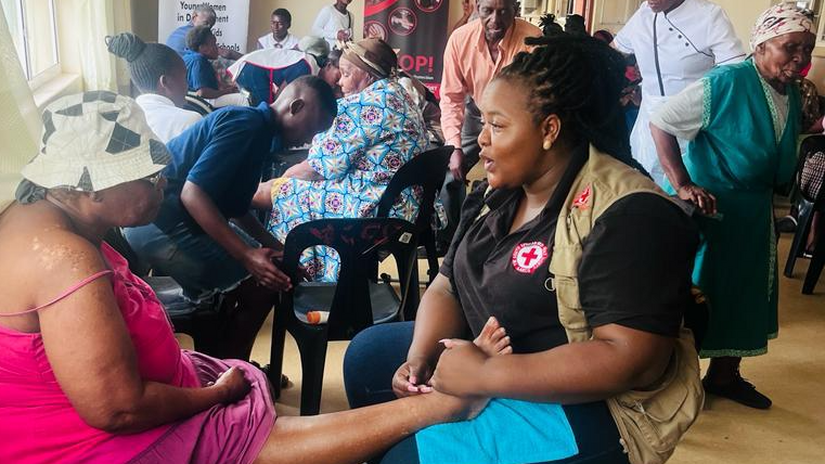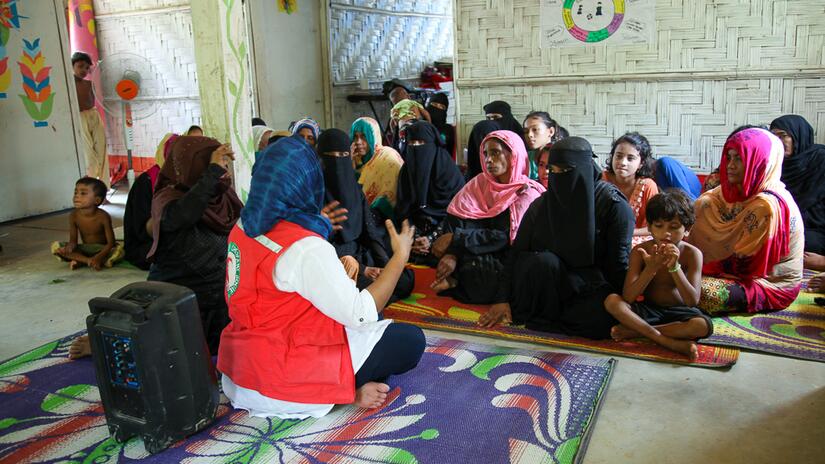Over 16 days from late November into December, the IFRC joined Red Cross and Red Crescent Societies around the world in putting a spotlight on the need to prevent sexual- and gender-based violence.
The protection of people from sexual and gender-based violence is already a key part of the IFRC network’s approach in its response operations following crisis – when people can be particularly susceptible to exploitation.
The 16 Days of Activism against Gender-Based Violence campaign offers an important opportunity to raise and reinforce awareness and improve practices to ensure people are protected when they are at their most vulnerable.
An annual global campaign, the 16 Days of Activism runs from 25 November, the International Day for the Elimination of Violence Against Women, to 10 December, International Human Rights Day.
The aim of the campaign is to raise awareness on intimate partner violence, trafficking in persons for the purposes of sexual exploitation and abuse, and other forms of sexual and gender-based violence. This year, IFRC's 16 Days of Activism campaign focuses on shedding light on the harm, prevalence, and impact of SGBV on survivors.
It’s also an important opportunity, therefor, to highlight the voices of people who work on prevention of SGBV all year long and who understand the impact that such violence has on survivors.
One of those people Hloniphile Zinya, a youth officer for the South African Red Cross, who is making a significant impact in the fight against HIV and gender-based violence of Kwa-Zulu Natal, South Africa.
“I grew up in an era where young people couldn’t freely talk to their parents or adults about sexual reproductive health or gender-based issues,” Zinya says. “This then contributed to a lot of young people becoming victims [of sexual abuse, violence or of sexually transmitted diseases].
Through her work, she has gained a profound understanding of the diverse community dynamics and their contributions to issues related to HIV and GBV. “I have also observed that survivors of gender-based violence undergo a lot of post trauma that in most cases influences the way they respond to life,” she says. “Most of the survivors are judged by others, thus making it difficult for them to come out and speak about their experiences.” See a deeper profile of Hloniphile Zinyaand her work by clicking here.

A youth officer for the South African Red Cross, Hloniphile Zinya (right), works with seven Red Cross branches to prevent HIV and gender-based violence in Kwa-Zulu Natal, South Africa.
Photo: South African Red Cross
Pervasive but preventable
Although pervasive, sexual and gender-based violence is preventable. The IFRC campaign, therefore, has emphasized creating awareness among aid workers, communities, Red Cross and Red Crescent staff, and volunteers about the needs of victims and survivors. The campaign also aims to address stigma and discrimination against those affected by SGBV.
Here are just a few of the things the IFRC and Red Cross and Red Crescent National Societies are doing around the world.
Africa
In Zambia, the Red Cross is holding a symposium about investing in the prevention of violence against women and girls. South Africa Red Cross is hosting multiple activities across the country – from soup kitchens, and awareness campaigns at taxi ranks, to talks at schools and elder care homes. Lesotho Red Cross will host a fun-run and health talks, including providing Mental Health and Psychosocial Support (MHPSS) messages to deaf and hard of hearing care givers on SGBV and protection.
The Americas
In the Americas region, the IFRC is conducting a survey to gather volunteers’ perceptions about gendered violence and the types of support that we can provide to victims/survivors, such as referral to important lifesaving health, financial and legal aid services. The Colombia Red Cross is focusing on the issue of trafficking in persons and the risks and needs of at-risk people along transitory routes.
Europe
The Europe regional office is launching a Protection Gender and Inclusion (PGI) and SGBV guidance series and will host webinars as well as a photo exhibition in their office in Budapest, Hungary. In Türkiye, the team is sharing information on dignity kits that are given to women and girls affected by the earthquake, showing that steps to promote gender equality and access to goods and services generate resilient communities, and ultimately can prevent risks of SGBV occurring.
Asia and Pacific
In the Asia and the Pacific region, the Bangladesh Red Crescent supported by IFRC will hold information sessions for volunteers and communities to increase awareness on preventing SGBV. IFRC staff in Bangladesh will also engage in a quiz to test their knowledge on what to do and how to address SGBV in their daily work. Pacific National Societies will engage in a Human Rights Film Festival in Suva, where the 16 Days of Activism campaign is integrated into the overall programme.

